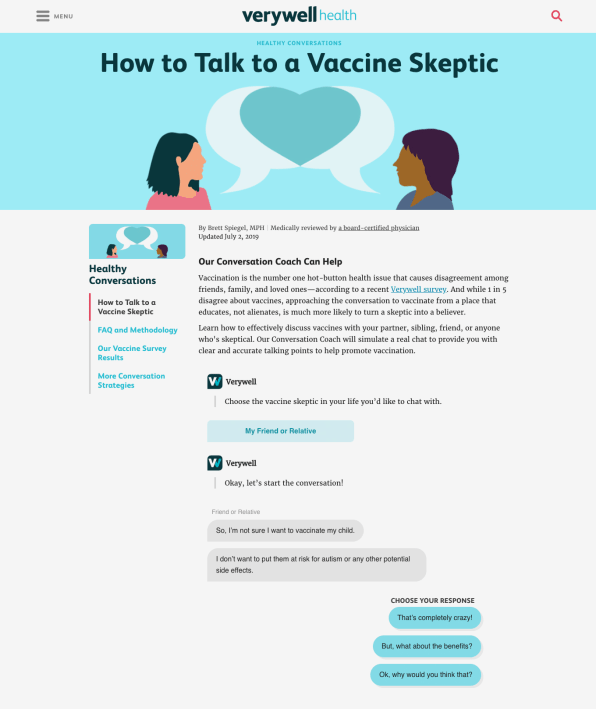This new app helps you talk to the vaccine skeptic in your life
How do you have a conversation with someone who disagrees with you about vaccines? Chances are, it’ll end in a shouting match.
Verywell, a health information website, is trying to help people find ways to communicate with the vaccine skeptics in their lives. Earlier this year, the site launched an interactive experience called “Healthy Conversations” that uses the format of a choose-your-own-adventure text message conversation to help users learn about tactics they can use to have a productive dialogue with someone who is unsure about vaccines.
When you start using the web app, you can choose to have a conversation with a friend, relative, or partner. Then Verywell will play the part of the vaccine skeptic, kicking off the conversation with something like “So, I’m not sure I want to vaccinate my child. I don’t want to put them at risk for autism or any other potential side effects.” You can pick your response from a series of options, which range from inflammatory (“That’s completely crazy!”) to empathetic (“Ok, why would you think that?”).

“It’s important not to alienate your friend or relative at the very beginning of a discussion on such an already sensitive topic about a child that is not your own,” the interactive points out if you choose the first “crazy” option. “You need to be allies here, and you need to understand that you are opening a dialogue, not passing a judgement.”
The conversational tool guides users toward choosing responses that are focused on listening, finding common ground, and seeking advice from a medical professional (not from social media, where health misinformation abounds). Once you’ve finished going through the conversation, Verywell also provides a downloadable conversation script and a guide to discuss vaccination with a doctor for people looking for more resources.
“It’s not enough to understand the science behind vaccines, that it doesn’t cause autism,” says Rob Parisi, the general manager at Verywell. “You have to be able to have the conversation in a very empathetic way, coming from a point of curiosity and listening to the person and understanding their point of view too, not hitting them over the head with facts.” That being said, Healthy Conversations does include facts: Once you’ve established that you’re listening and being empathic, the tool does tell users that they should be informing their family member that vaccines do not cause autism and the purported link has been thoroughly debunked.
Conversational interfaces like this one have also been used in e-commerce, banking, and customer service applications. But Healthy Conversations is an intriguing case study for another way they could be used: To help change people’s beliefs and fight misinformation.
Verywell is similar to WebMD, but its content is written by healthcare experts. The site decided to develop the tool earlier this year, when the largest outbreak of measles since 2000 broke out. (Officials thought the disease had been nearly eradicated in the United States and credit anti-vaxxers with its spread). The website commissioned a survey of 1,000 people on what kinds of resources people were looking for when it came to vaccines and found that one in five Americans disagreed with friends and families about immunization. Of those that disagreed with their loved ones, 40% were seeking advice on how to have difficult conversations about the topic, and 25% said that techniques for communication would be helpful.
Could a conversation really convince someone whose mind is already made up? Maybe not. During the development process, Verywell’s content director, Brett Spiegel, spoke with a few people who are against vaccines, and he reports that the discussion instantly became heated. “You can’t speak to extreme people who’ve already made up their minds—they’re so aggressively against vaccination that there’s really not talking to them,” he says. “That opened up [the question of] where we could actually make change. We knew there were parents struggling with this decision, because they were misinformed or they were scared their child would have an adverse reaction. They needed more education.”
The site’s team determined that their biggest opportunity to change a skeptic’s mind was around what they call the “point of concern”—when someone initially starts pondering whether they should seek medical care or not. “This point of concern dictates whether they get to the point of care,” says Parisi. “If you’re not having successful conversations with someone about vaccines, you’re not going to get to the point of care.”
Spiegel wrote the app’s conversation script with the advice of multiple medical professionals, including board-certified psychiatrist Steven Gans, who is an assistant professor of psychiatry at Harvard Medical School, and Richard Fogoros, Verywell’s senior medical adviser. The decision to format it like a texting conversation was meant to broaden its accessibility to Verywell’s heavily mobile audience. The design, combined with the clever way the tool guides users through a mock conversation, has led to about one-third of users completing the interaction.
Verywell is working on more editions of its Healthy Conversations tool, focused on other difficult conversations people might encounter regarding their health and the health of their loved ones. Right now, the team is developing guides for how to discuss a cancer diagnosis, how to talk to your aging parents about assisted living, and why health insurance is important.
(16)



